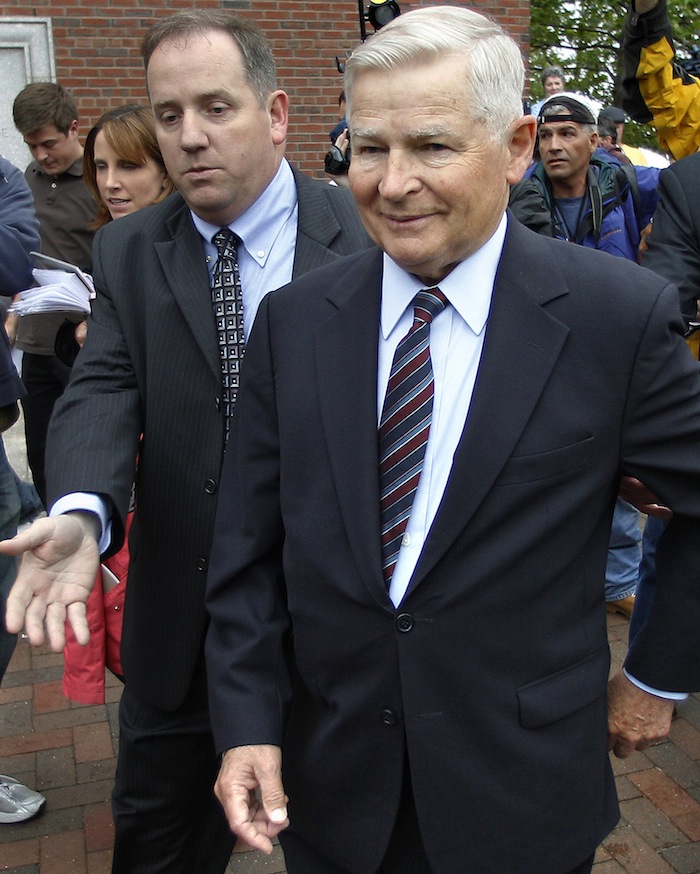BOSTON — Boston mobster James “Whitey” Bulger had family supporters at his racketeering trial, but one person has been missing: his brother William, once one of Massachusetts’ most powerful politicians.
While Whitey Bulger rose to power in Boston’s criminal underworld in the 1970s and ’80s and became a feared mob boss, William Bulger ruled the state Senate for nearly two decades with a razor-sharp wit and legislative arm-twisting. He also later headed the five-campus University of Massachusetts system.
For the past few years, though, his legacy has been eclipsed by the capture and prosecution of his older brother, once one of the FBI’s most wanted.
Two years after he was captured on the run in California, Whitey Bulger was convicted Monday in federal court on 11 killings he took part in and other gangland crimes that he committed while he led the Winter Hill Gang, Boston’s ruthless Irish mob.
Throughout the older Bulger’s summer-long trial, with its testimony by aging gangsters who gave lurid details of murders, William Bulger made no public statements and didn’t talk to the press. He doesn’t even have a listed phone number at his South Boston address.
Another Bulger brother, Jackie, himself a retired court clerk magistrate, has attended the trial, as have several of William Bulger’s children.
To those who know him, William Bulger’s decision to avoid the trial isn’t a surprise.
Joseph Oteri, who grew up with Bulger, said part of Bulger’s low profile may be health related; he had heart surgery a few years back. But Oteri said it might also be a desire to maintain some semblance of privacy surrounding his relationship with his brother.
“I’m from South Boston and we have certain codes there, and one of them is you don’t pry into people’s lives.” Oteri said. “If they wanted you to know something, they’d let you know.”
Bulger revealed a bit about his relationship with his older brother in his 1996 memoir “While the Music Lasts.”
He portrayed a young Whitey — he refers to him as “Jim” — as being in “a constant state of revolt” and as “restless as a claustrophobic in a dark closet.” He also said Whitey shunned cigarettes, alcohol and drugs and had “an abundance of good humor and a wildly creative talent for impish mischief.”
As a child, he said his brother even kept an ocelot he named Lancelot in the bedroom they shared.
Bulger said it was later that Whitey fell in with a crowd involved in bank holdups and began what prosecutors said was a decades-long hold on Boston’s criminal underworld.
“I had seen him change from a blithe spirit to a rebel whose cause I could never discern,” Bulger wrote.
As Whitey’s criminal activities turned more brutal, William Bulger climbed the Statehouse ranks. In 1970, he won a Senate seat and eight years later was elected Senate president, a position he would hold for a record 17 years.
But despite their rising public profiles for diverging reasons, William remained loyal to his older brother. Even after Whitey fled Boston in 1995 of the eve of his indictment on racketeering charges, William accused overzealous prosecutors of buying testimony from others against his brother with promises of early release from prison.
“It has been known for many years that a ‘get out of jail’ card has been available to anyone who would give testimony against my brother,” he wrote.
Bulger’s loyalty would dog his career, however, forcing his resignation as University of Massachusetts president in 2003 after he testified before a congressional committee probing the FBI’s ties to his brother.
After receiving immunity from prosecution, William acknowledged receiving a call from Whitey shortly after he fled.
“The tone of it was ‘Don’t believe everything that is being said about me,'” William Bulger said at the time. “I think he asked me to tell everybody he was OK. … I think I said I hope this has a happy ending.”
Two years earlier, William Bulger had told a grand jury he didn’t urge his brother to surrender because he didn’t “think it would be in his interest to do so,” according to a transcript of his testimony obtained by The Boston Globe.
William Bulger’s tone has turned more conciliatory in recent years.
In a statement following Whitey’s 2011 arrest, William said he wished to “express my sympathy to all the families hurt by the calamitous circumstances of this case.”
During Whitey’s arraignment in federal court that year, the aging brothers had a fleeting reunion of sorts. Whitey smiled at his younger brother and mouthed the word “hi.” William smiled back.
William, speaking briefly to reporters as he left the courthouse, appeared emotional.
“It’s an unusual experience,” he said.
Send questions/comments to the editors.



Success. Please wait for the page to reload. If the page does not reload within 5 seconds, please refresh the page.
Enter your email and password to access comments.
Hi, to comment on stories you must . This profile is in addition to your subscription and website login.
Already have a commenting profile? .
Invalid username/password.
Please check your email to confirm and complete your registration.
Only subscribers are eligible to post comments. Please subscribe or login first for digital access. Here’s why.
Use the form below to reset your password. When you've submitted your account email, we will send an email with a reset code.